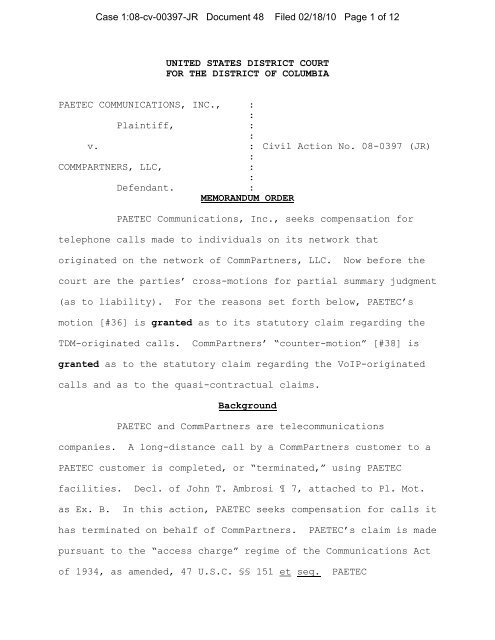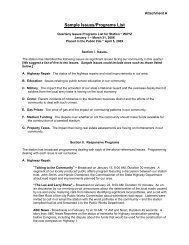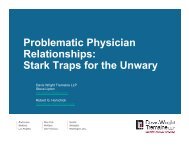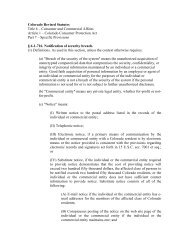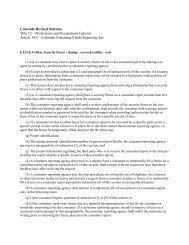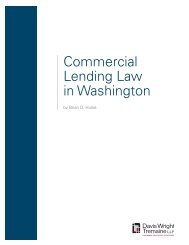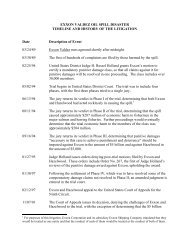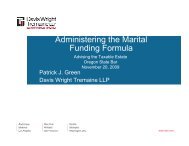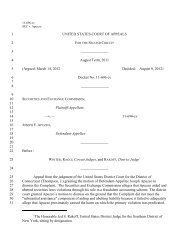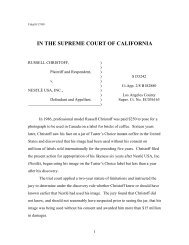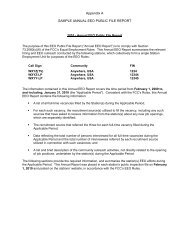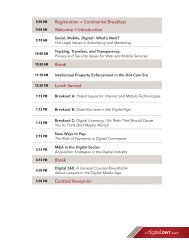Paetec Communications v. CommPartners, LLC - Telecom Law ...
Paetec Communications v. CommPartners, LLC - Telecom Law ...
Paetec Communications v. CommPartners, LLC - Telecom Law ...
Create successful ePaper yourself
Turn your PDF publications into a flip-book with our unique Google optimized e-Paper software.
Case 1:08-cv-00397-JR Document 48 Filed 02/18/10 Page 1 of 12<br />
UNITED STATES DISTRICT COURT<br />
FOR THE DISTRICT OF COLUMBIA<br />
PAETEC COMMUNICATIONS, INC., :<br />
:<br />
Plaintiff,<br />
:<br />
v .<br />
:<br />
: Civil Action No. 08-0397 (JR)<br />
COMMPARTNERS, <strong>LLC</strong>,<br />
Defendant.<br />
:<br />
:<br />
:<br />
:<br />
MEMORANDUM ORDER<br />
PAETEC <strong>Communications</strong>, Inc., seeks compensation for<br />
telephone calls made to individuals on its network that<br />
originated on the network of <strong>CommPartners</strong>, <strong>LLC</strong>. Now before the<br />
court are the parties’ cross-motions for partial summary judgment<br />
(as to liability). For the reasons set forth below, PAETEC’s<br />
motion [#36] is granted as to its statutory claim regarding the<br />
TDM-originated calls. <strong>CommPartners</strong>’ “counter-motion” [#38] is<br />
granted as to the statutory claim regarding the VoIP-originated<br />
calls and as to the quasi-contractual claims.<br />
Background<br />
PAETEC and <strong>CommPartners</strong> are telecommunications<br />
companies. A long-distance call by a <strong>CommPartners</strong> customer to a<br />
PAETEC customer is completed, or “terminated,” using PAETEC<br />
facilities. Decl. of John T. Ambrosi 7, attached to Pl. Mot.<br />
as Ex. B. In this action, PAETEC seeks compensation for calls it<br />
has terminated on behalf of <strong>CommPartners</strong>. PAETEC’s claim is made<br />
pursuant to the “access charge” regime of the <strong>Communications</strong> Act<br />
of 1934, as amended, 47 U.S.C. §§ 151 et seq. PAETEC
Case 1:08-cv-00397-JR Document 48 Filed 02/18/10 Page 2 of 12<br />
alternatively asserts unjust enrichment and quantum meruit<br />
claims.<br />
Crucial to this action is the distinction between two<br />
formats for transmitting calls: Time-Division Multiplexing<br />
(“TDM”) and Voice over Internet Protocol (“VoIP”). VoIP is newer<br />
than TDM, and VoIP calls can be transmitted over either the<br />
public Internet or over closed networks. See Decl. of David S.<br />
Clark 10-11, attached to Pl. Mot. at Ex. A. Calls initiated<br />
in one format can be converted to the other during transmission,<br />
and a call may be converted once or multiple times. See Pl. Mot.<br />
at 6.<br />
There are two types of calls at issue, to which<br />
different compensation regimes may apply: (1) calls that began on<br />
<strong>CommPartners</strong>’ network in VoIP before being converted by<br />
<strong>CommPartners</strong> to TDM for transfer to PAETEC (the “VoIP-originated<br />
calls”); and (2) calls that both began and were transferred in<br />
TDM (the “TDM-originated calls”). PAETEC contends that both<br />
types of calls are subject to access charges. <strong>CommPartners</strong><br />
concedes that access charges apply to the TDM-originated calls,<br />
but argues that they do not apply to VoIP-originated calls.<br />
The access charge regime was established in the 1980s<br />
to govern compensation for long-distance telephony. See Sw. Bell<br />
Tel., L.P. v. Mo. Pub. Serv. Comm., 461 F. Supp. 2d 1055, 1074<br />
(E.D. Mo. 2006). “Access charges historically have included<br />
- 2 -
Case 1:08-cv-00397-JR Document 48 Filed 02/18/10 Page 3 of 12<br />
significant implicit subsidies and by definition have been well<br />
above cost.” Id. at 1075 (internal quotation marks omitted).<br />
VoIP-Originated Calls<br />
The central dispute here concerns PAETEC’s assertion<br />
that its tariffs lawfully require application of access charges<br />
to VoIP-originated calls.<br />
A. Tariff<br />
Each carrier must file with the FCC a schedule of its<br />
charges for interstate wire communication using its network. See<br />
47 U.S.C. § 203(a). This schedule is known as the carrier’s<br />
tariff. Tariffs, once approved, “are the law, and not mere<br />
contracts.” Bryan v. Bellsouth Comm’ns, Inc., 377 F.3d 424, 429<br />
(4th Cir. 2004). The applicable portion of PAETEC’s federal<br />
tariff provides that access services, to which access charges<br />
apply, include:<br />
all services and facilities provided by [PAETEC]<br />
for the origination or termination of any<br />
interstate or foreign telecommunications using<br />
[PAETEC’s] network or origination or termination<br />
of other services utilizing the same [PAETEC]<br />
network services or functionality regardless of<br />
the technology used in transmission. This<br />
includes, but is not limited to, Internet<br />
Protocol or similar services.<br />
PAETEC FCC Tariff No. 3, § 1.2, attached to Def. Cross-Mot. as<br />
Ex. 6 (emphasis added). 1<br />
1<br />
PAETEC’s intrastate tariffs contain similar language.<br />
- 3 -
Case 1:08-cv-00397-JR Document 48 Filed 02/18/10 Page 4 of 12<br />
Relying on the language of its tariff, PAETEC asserts<br />
that its termination of VoIP-originated calls is an access<br />
service. <strong>CommPartners</strong> begs to differ, arguing that the words<br />
“regardless of the technology used in transmission” refer only to<br />
the technology used by PAETEC, the terminating party.<br />
<strong>CommPartners</strong> loses this argument: the tariff contains no express<br />
or implied limitation on who is doing the transmitting. The<br />
terms of the tariff are unambiguous: access charges apply<br />
regardless of the technology used at any point in transmission.<br />
<strong>CommPartners</strong>’ next argument is more substantial. It is<br />
that, if PAETEC’s tariff does cover VoIP-originated calls, it<br />
conflicts with general intercarrier compensation law, as<br />
established by the <strong>Communications</strong> Act and regulations promulgated<br />
thereunder. Here, PAETEC relies on the so-called “filed-rate<br />
doctrine,” arguing that its tariff must prevail over any other<br />
consideration. The dispositive question, then, is whether the<br />
statutory provisions to which <strong>CommPartners</strong> avers are trumped by<br />
PAETEC’s tariff.<br />
B. <strong>Communications</strong> Act<br />
<strong>CommPartners</strong> asserts two independent reasons why<br />
PAETEC’s tariff may not be applied to VoIP-originated calls:<br />
(1) that its termination of VoIP-originated calls is an<br />
“information service” exempt from access charges; and (2) that<br />
- 4 -
Case 1:08-cv-00397-JR Document 48 Filed 02/18/10 Page 5 of 12<br />
access charges cannot apply to VoIP-originated calls because<br />
“reciprocal compensation” applies instead.<br />
1. Information Service Exception 2<br />
Information services are not subject to the access<br />
charge regime. See In re AT&T Access Charge Petition, 19<br />
F.C.C.R. 7457, 7459-61, 4-7 (2004). Information services are<br />
defined as “the offering of a capability for generating,<br />
acquiring, storing, transforming, processing, retrieving,<br />
utilizing, or making available information via<br />
telecommunications.” 47 U.S.C. § 153(20). They include<br />
“protocol conversion (i.e., ability to communicate between<br />
networks that employ different data-transmission formats).”<br />
Nat’l Cable & <strong>Telecom</strong>ms. Ass’n v. Brand X Internet Servs., 545<br />
U.S. 967, 977 (2005) (citing Second Computer Inquiry, 77 F.C.C.<br />
2d 384, 417-23 (1980)). Information services are not<br />
telecommunications services, which merely transmit without<br />
alteration. See 47 U.S.C. §§ 153(43), 153(46); Brand X, 545 U.S.<br />
at 975-76. The two categories are mutually exclusive. See Sw.<br />
Bell, 461 F. Supp. 2d at 1078; Stevens Report, 13 F.C.C.R. 11830,<br />
2<br />
Under law prior to the 1996 <strong>Telecom</strong>munications Act, this<br />
exception was called the enhanced services exception or ESP<br />
exception. See Non-Accounting Safeguards Order, 11 F.C.C.R.<br />
21905, 21955-58, 102-07 (1998). The Act essentially codified<br />
the pre-existing exception. See Nat’l Cable & <strong>Telecom</strong>m’ns Ass’n<br />
v. Brand X Internet Servs., 545 U.S. 967, 975-77 (2005) (noting<br />
similarity of the Act’s terminology to that of pre-Act FCC<br />
decisions).<br />
- 5 -
Case 1:08-cv-00397-JR Document 48 Filed 02/18/10 Page 6 of 12<br />
11507, 13 (1998). But services that combine both<br />
telecommunications and information components are treated as<br />
information services. See Brand X, 545 U.S. at 989-90; Sw. Bell,<br />
461 F. Supp. 2d at 1078 (citing CALEA Order, 20 F.C.C.R. 14989<br />
(2005)). <strong>CommPartners</strong> thus contends that VoIP-to-TDM conversion<br />
results in an information service.<br />
The telecommunications industry has been “raging for<br />
years” with debate about these arguments, Pl. Reply at 7. The<br />
FCC, which has had the controversy on its docket for a decade,<br />
3<br />
has been unable to decide it. Two federal district courts have<br />
considered the issue. Both have decided that transmissions which<br />
include net format conversion from VoIP to TDM are information<br />
services exempt from access charges. See Sw. Bell, 461 F. Supp.<br />
2d at 1081-83; Vonage Holdings Corp. v. Minn. Pub. Utils. Comm’n,<br />
290 F. Supp. 2d 993, 999-1001 (D. Minn. 2003). Their reasoning<br />
is persuasive. As the Sw. Bell court observed, “[n]et-protocol<br />
conversion is a determinative indicator of whether a service is<br />
an enhanced or information service.” 461 F. Supp. 2d at 1081-82<br />
3<br />
The FCC has determined that non-net protocol conversions do not<br />
constitute information services. See In re AT&T, 19 F.C.C.R. at<br />
7465-66, 12-13. That is, if a company converts a TDM signal to<br />
VoIP and then back to TDM before handing it off, no information<br />
service is provided. See id. at 7466, 13 (“This order . . .<br />
addresses only AT&T’s specific service, and that service does not<br />
involve a net protocol conversion. . . . If the service<br />
evolves . . . , the Commission could revisit its decision in this<br />
order.”). It could – but it hasn’t.<br />
- 6 -
Case 1:08-cv-00397-JR Document 48 Filed 02/18/10 Page 7 of 12<br />
(citing In re Non-Accounting Safeguards, 11 F.C.C.R. 21905,<br />
21956, 104 (1996)).<br />
I find that <strong>CommPartners</strong>’ transmission and net<br />
conversion of the calls is properly labeled an information<br />
service. 4<br />
2. Reciprocal Compensation<br />
Reciprocal compensation and access charges are mutually<br />
5<br />
exclusive methods of intercarrier compensation. See 47 U.S.C.<br />
§ 251(b)(5); WorldCom, Inc. v. FCC, 288 F.3d 429, 433-34 (D.C.<br />
Cir. 2002). The reciprocal compensation regime was created by<br />
the <strong>Telecom</strong>munications Act of 1996 (the “1996 Act”), which also<br />
retained the pre-existing access charge regime, but in a limited<br />
fashion. See 47 U.S.C. § 251(g) (retention provision). Under<br />
the 1996 Act, reciprocal compensation is the norm; access charges<br />
apply only where there was a “pre-Act obligation relating to<br />
inter-carrier compensation.” WorldCom, 288 F.3d at 433.<br />
There cannot be a pre-Act obligation relating to intercarrier<br />
compensation for VoIP, because VoIP was not developed<br />
4<br />
The parties disagree about whether the information service<br />
exception applies only to interstate calls, or whether it can<br />
reach intrastate traffic as well. See Pl. Reply at 11; Def.<br />
Reply at 11-13. I need not decide the issue, as the information<br />
service exception is but one of two independent grounds<br />
supporting <strong>CommPartners</strong>.<br />
5<br />
Unlike access charges, reciprocal compensation can apply to<br />
information services. See Sw. Bell, 461 F. Supp. 2d at 1081<br />
n.19.<br />
- 7 -
Case 1:08-cv-00397-JR Document 48 Filed 02/18/10 Page 8 of 12<br />
until the 1996 Act was passed. Accord Sw. Bell, 461 F. Supp. 2d<br />
at 1080 (“[B]ecause [VoIP-to-TDM] is a new service developed<br />
after the [1996] Act, there is no pre-Act compensation regime<br />
which could have governed it, and therefore § 251(g) is<br />
inapplicable.”). PAETEC’s submission that the analysis should<br />
turn not on whether companies actually paid access charges for<br />
VoIP prior to the Act, but instead whether pre-Act law would have<br />
supported such charges -- is not so much an argument as an<br />
invitation to speculate. The invitation is declined.<br />
C. Filed-Rate Doctrine<br />
Under the <strong>Communications</strong> Act, tariffs “are the law, and<br />
not contracts”; and PAETEC’s tariff imposes access charges on<br />
VoIP-originated calls. The FCC accepted PAETEC’s tariff for<br />
filing, even though the compensation-governing provisions of the<br />
<strong>Communications</strong> Act and interpretive regulatory decisions<br />
thereunder point away from the access charges PAETEC purports to<br />
impose on VoIP-originated calls.<br />
Under the filed-rate doctrine, customers are “charged<br />
with notice of the terms and rates set out in the filed tariff<br />
and may not bring an action against a carrier that would<br />
invalidate, alter, or add to the terms of the filed tariff.”<br />
Evanns v. AT&T Corp., 229 F.3d 837, 840 (9th Cir. 2000). “The<br />
filed-rate doctrine precludes courts from deciding whether a<br />
tariff is reasonable, reserving the evaluation of tariffs to the<br />
- 8 -
Case 1:08-cv-00397-JR Document 48 Filed 02/18/10 Page 9 of 12<br />
FCC.” Brown v. MCI Worldcom Network Servs., Inc., 277 F.3d 1166,<br />
1171 (9th Cir. 2002).<br />
In this case, nevertheless, PAETEC’s tariff must give<br />
way. “A tariff filed with a federal agency is the equivalent of<br />
a federal regulation.” Cahnmann v. Spring Corp., 133 F.3d 484,<br />
488 (7th Cir. 1998). As such, a tariff cannot be inconsistent<br />
with the statutory framework pursuant to which it is promulgated.<br />
At least one circuit has reached a similar conclusion. In that<br />
case, Iowa Network Services (“INS”) filed state and federal<br />
tariffs that purported to apply access charges to transmission of<br />
certain wireless traffic. See INS v. Qwest Corp, 466 F.3d 1091,<br />
1093-95 (8th Cir. 2006). However, the statutory framework for<br />
the wireless traffic, combined with state and federal regulatory<br />
processes pursuant to that framework, established that access<br />
charges could not apply. See id. at 1095-97. After considering<br />
the conflict, the court held that the tariffs must yield. See<br />
id. at 1097. The court found that its decision did not<br />
improperly invalidate the tariffs, in violation of the filed-rate<br />
doctrine, because they could still be applied to traffic which<br />
the statutory and framework allowed them to reach. See id.<br />
Similarly, the decision did not alter the terms of the tariff;<br />
the disputed terms were simply ultra vires and lacked legal<br />
force.<br />
- 9 -
Case 1:08-cv-00397-JR Document 48 Filed 02/18/10 Page 10 of 12<br />
The Eighth Circuit decision in Qwest may appear to be<br />
an inventive piece of legal legerdemain, but it applies the tools<br />
that are available to courts (the FCC has much better ones, but<br />
will not use them), and it is supported by sound policy<br />
considerations.<br />
The FCC sometimes has as few as fifteen days to<br />
consider whether to object to a tariff that contains a rate<br />
increase before it goes into effect. See 47 U.S.C. § 204(a)(3).<br />
To treat tariffs as inviolable would create incentives to bury<br />
within tariffs provisions that expand their rates beyond<br />
statutory allowance in the hope that the FCC will not notice.<br />
See INS v. Qwest Corp., 385 F. Supp. 2d 850, 899 (S.D. Iowa 2005)<br />
(characterizing the tariffs in that case as an attempt to<br />
“sidestep” the applicable legal framework and “a strategic<br />
attempt to thwart the impact of the 1996 Act”). The purposes of<br />
the filed-rate doctrine -- to prevent discrimination among<br />
consumers and preserve the rate-making authority of federal<br />
agencies, see Bryan v. Bellsouth Comm’ns, Inc. 377 F.3d 424, 429<br />
(4th Cir. 2004); Hill v. BellSouth Telcomms., Inc., 364 F.3d<br />
1308, 1316 (11th Cir. 2004) -- are not undercut by the Eighth<br />
Circuit’s decision, or by mine.<br />
There are differences between Qwest and this case, to<br />
be sure, but they do not justify a different outcome here.<br />
First, in the background of the Qwest case were rulings of the<br />
Iowa Utilities Board that access charges were inapplicable to the<br />
- 10 -
Case 1:08-cv-00397-JR Document 48 Filed 02/18/10 Page 11 of 12<br />
traffic at issue. See Qwest, 385 F. Supp. 2d at 863. Those<br />
regulatory decisions were not dispositive, however; indeed,<br />
earlier in the case the Eighth Circuit reversed the district<br />
court for treating them as preclusive and ordered it instead to<br />
“decide for itself whether the traffic at issue is subject to<br />
access charges pursuant to INS’s tariffs.” INS v. Qwest Corp.,<br />
363 F.3d 683, 695 (8th Cir. 2004). Second, the court’s refusal<br />
to apply the filed-rate doctrine in Qwest was supported both by<br />
the compensation-governing provisions of 47 U.S.C. § 251 and by<br />
the provision governing the scope of tariffs located at 47 U.S.C.<br />
§ 203(a). See Qwest, 466 F.3d at 1095-97. My decision turns<br />
only on § 251, yet the Qwest decision could stand alone on its<br />
persuasive holding that tariffs cannot be applied inconsistently<br />
with the <strong>Communications</strong> Act, which is where § 251 resides.<br />
Because the access charge regime is inapplicable to<br />
VoIP-originated tariff, and because a filed tariff cannot be<br />
inconsistent with the statutory framework pursuant to which it is<br />
promulgated, the filed-rate doctrine must yield in this case.<br />
TDM-Originated Calls<br />
<strong>CommPartners</strong> concedes its duty to pay access charges<br />
for TDM-originated calls. See Def. Cross-Mot. at 1 n.1.<br />
PAETEC<br />
suggests that this concession should entitle it to an award of<br />
attorneys fees and costs based on the terms of its tariff. See<br />
PAETEC Tariff F.C.C. No. 3 at § 2.4.6 (requiring such fees if<br />
- 11 -
Case 1:08-cv-00397-JR Document 48 Filed 02/18/10 Page 12 of 12<br />
PAETEC “substantially prevails” in litigation). <strong>CommPartners</strong><br />
disputes PAETEC’s assertion. The parties urge an immediate<br />
determination of that question, but at this point I am ruling<br />
only on liability. The question of what it means to<br />
“substantially prevail” must await the damages phase, when the<br />
factual record will be more complete.<br />
Quasi-Contractual Claims<br />
Injecting common law claims into intercarrier<br />
compensation would undermine the complex scheme Congress and the<br />
FCC have established. Because the <strong>Communications</strong> Act establishes<br />
the exclusive methods of intercarrier compensation for the calls<br />
at issue, PAETEC’s unjust enrichment and quantum meruit claims<br />
are statutorily barred. See Qwest, 466 F.3d at 1098; MCI<br />
WorldCom Network Servs., Inc. v. PAETEC Comm’ns, Inc., 2005 WL<br />
2145499, at *5 (E.D. Va. Aug. 31, 2005).<br />
JAMES ROBERTSON<br />
United States District Judge<br />
- 12 -


